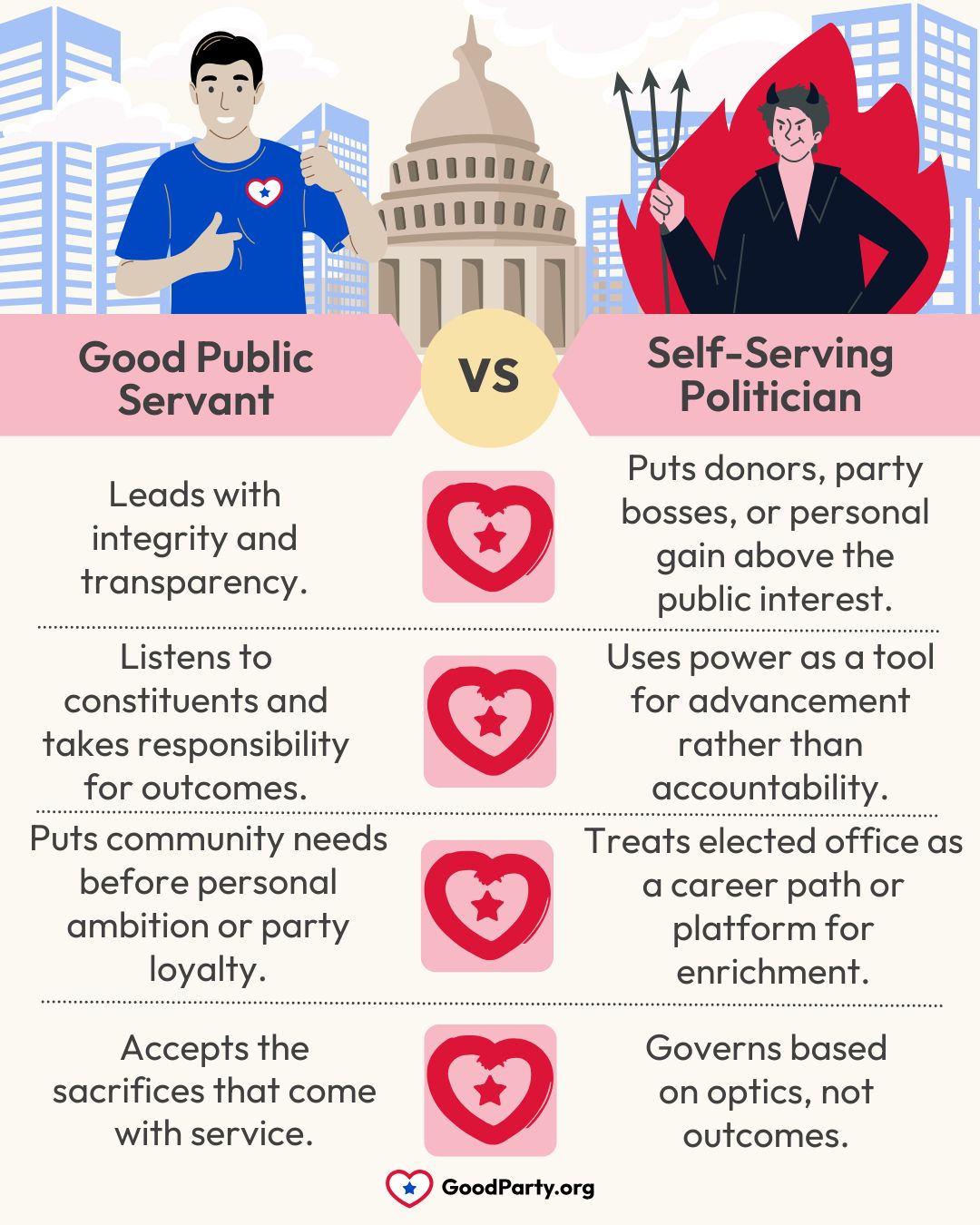
Public Servant vs. Politician: How to Lead with Integrity
Lately, when people think about politicians, the word conjures up images of power plays, self-serving careers, and backroom deals. But, at its best, politics is meant to be about something far simpler and more noble: service.
Public service is still alive, and these days, it matters more than ever. A true public servant prioritizes the people over partisan politics, community over career, and integrity over ambition. But what actually is a public servant, and what separates a good public servant from the stereotype of dark politics we’ve come to expect?
What Is a Public Servant?
At its core, a public servant is anyone who works in government or public institutions to serve the needs of the community. That definition includes both elected officials and the employees who keep public systems running day to day.
Some examples of public servants you may interact with every day include:
Local Elected Officials: City council members, township trustees, and school board representatives who shape policies closest to home.
State-Level Leaders: Governors, state legislators, and judges who set laws and oversee statewide programs.
Federal-Level Leaders: Senators, members of Congress, and the president are all elected to represent the public on a national scale.
Civil Servants: Public health officials, social workers, transportation planners, and postal workers who keep essential services running.
Frontline Workers: Teachers, police officers, firefighters, librarians, and sanitation workers who serve communities directly every day.
What ties all these roles together is a responsibility to the public. Whether you’re a school board trustee, a civil servant in a state agency, or a local police officer, the role comes with an expectation: to prioritize the public good above personal gain.
Public Servants vs. Civil Servants
The terms are often used interchangeably, but they’re not exactly the same:
Public servant is the broader term, and it includes elected officials, appointed leaders, civil servants, and frontline public workers.
Civil servant is more specific. It refers to career employees of government agencies who are hired rather than elected. Think of public health officials, postal workers, or city staff who implement policies and provide services.
Police officers are public servants because their role is to protect and provide for the community, but they’re not part of the government bureaucracy in the same way a tax assessor or DMV clerk is. Firefighters, EMTs, teachers, and librarians are also considered public servants, while food inspectors, urban planners, and a Department of Labor analyst are all civil servants.
In short, all civil servants are public servants, but not all public servants are civil servants. The dividing line is the administrative nature of the work and its proximity to the bureaucracy of government services.
LEARN MORE: Curious about what the government is like behind the scenes? Learn how to get involved in your local politics.
Qualities of a Good Public Servant
Not everyone who holds a public role lives up to the title of public servant. What truly sets a good public servant apart from the rest is less about position and more about practice.
The best public servants share five key qualities that ensure they put people above politics:
#1: Integrity
Integrity is the foundation of good public service. A public servant with integrity acts honestly, resists the corruption of big money, and makes decisions based on what is right, not what is politically convenient.
A good example of integrity in public service is Jimmy Carter. He famously lived modestly before, during, and after his presidency, and continued to serve communities through Habitat for Humanity and the Carter Center after leaving office rather than cashing in on his fame. Election officials resisting political pressure and threats in 2020 also upheld integrity in public service.
#2: Accountability
Good public servants are accountable to the people who put their trust in them, not just the wealthiest donors. That means listening to constituents, being transparent about decisions, and admitting mistakes when they happen.
When a local city council meeting is livestreamed and recorded, those elected officials embody the spirit of accountability and accessibility, encouraging transparency in government.
However, accountability is also about listening and responding to your community. Deb Haaland, former Secretary of the Interior and the first Indigenous woman to serve in federal office, frequently held listening sessions with Native communities to stay accountable and promote good public service.
LEARN MORE: See how GoodParty.org empowers elected officials to be more accountable to their constituents with Serve.
#3: Humility
True service requires humility. A good public servant remembers that their role exists to serve the community, not their own career ambitions. They don’t cling to power or view public office as a personal reward.
When George Washington decided to step down after two terms, setting the precedent that leadership is a responsibility, not a lifetime entitlement, he demonstrated humility in public service. Every teacher who has purchased classroom supplies from their own pocket and every public health worker during the COVID-19 pandemic showed how being a good public servant is about quietly doing what needs to be done, even without much recognition.
#4: Commitment to the Common Good
Public service should be about improving lives, not scoring political points. A good public servant prioritizes the needs of the community over partisanship, special interests, or donor influence.
To see what commitment to the common good looks like in practice, we can look at Abraham Lincoln’s leadership during the Civil War. His goal of preserving the Union and abolishing slavery was rooted in his dedication to the nation’s survival and progress above any personal or party gain.
Even today, we can see public servants demonstrating commitment to the common good in librarians resisting book bans to ensure their communities have access to information, and in public defenders who still show up to court despite overwhelming caseloads and little pay.
#5: Willingness to Sacrifice
Serving the public often requires giving up personal comfort, wealth, or recognition. Good public servants accept these sacrifices because they believe in the greater mission of service.
Every day, teachers, nurses, and public health officials work long hours with limited pay or resources. EMTs and firefighters put their lives on the line. Across the country, countless public servants endure long shifts, low pay, and rising political tensions, not for personal gain, but because their communities depend on them.
LEARN MORE: Explore how town hall meetings can bring together candidates, elected officials, and communities.
A Good Public Servant vs. Self-Serving Politician
The line between a good public servant and a self-serving politician is clear. One leads with service, the other with ambition.

The difference is about trust. A good public servant builds it by putting people first. A self-serving politician erodes it, leaving communities more cynical and disengaged.
This contrast is at the heart of why good public servants matter. They remind us that politics doesn’t have to be corrupt, transactional, or hopeless. It can still be about service.
Why Good Public Servants Matter in 2025
Today, distrust in government is at a historic high, with nearly 50% of Americans saying they don’t trust the federal government. Many people assume that politics is only about corruption, partisanship, or self-interest. That’s exactly why good public servants are more important than ever.
Good public servants, through their efforts, can:
Rebuild trust by acting with integrity.
Strengthen communities by listening and responding to real needs.
Prove that politics can still be about people, not power.
They remind us that politics can still be about people, and they keep communities functioning. Every time a good public servant puts people first, they rebuild trust in democracy and prove that public service still means something.
LEARN MORE: Explore how voting Independent can promote a fairer and stronger democracy.
Your Role in Public Service
The truth is, good public servants don’t just appear on the national stage. They start in local communities, on school boards, city councils, and neighborhood committees. They’re teachers, nurses, social workers, and everyday people who decide to lead with integrity.
Every great public servant started as an ordinary person who wanted to make a difference. That could be you.
If you feel called to serve, you don’t have to do it alone. GoodParty.org Serve is here to empower local elected officials to govern effectively and ethically. It’s designed for leaders who want to live up to the highest ideals of public service and become the kind of servant their communities deserve.
Photo by Sora Shimazaki
Answer the call. Explore Serve today and take your first step toward becoming a good public servant.

